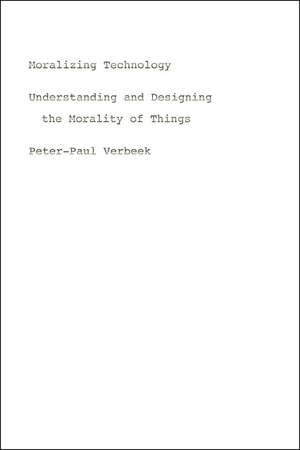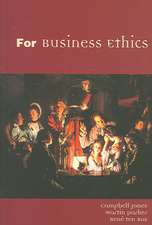Moralizing Technology: Understanding and Designing the Morality of Things
Autor Peter-Paul Verbeeken Limba Engleză Paperback – noi 2011
Technology permeates nearly every aspect of our daily lives. Cars enable us to travel long distances, mobile phones help us to communicate, and medical devices make it possible to detect and cure diseases. But these aids to existence are not simply neutral instruments: they give shape to what we do and how we experience the world. And because technology plays such an active role in shaping our daily actions and decisions, it is crucial, Peter-Paul Verbeek argues, that we consider the moral dimension of technology.
Moralizing Technology offers exactly that: an in-depth study of the ethical dilemmas and moral issues surrounding the interaction of humans and technology. Drawing from Heidegger and Foucault, as well as from philosophers of technology such as Don Ihde and Bruno Latour, Peter-Paul Verbeek locates morality not just in the human users of technology but in the interaction between us and our machines. Verbeek cites concrete examples, including some from his own life, and compellingly argues for the morality of things. Rich and multifaceted, and sure to be controversial, Moralizing Technology will force us all to consider the virtue of new inventions and to rethink the rightness of the products we use every day.
Preț: 213.64 lei
Nou
Puncte Express: 320
Preț estimativ în valută:
40.89€ • 42.24$ • 34.03£
40.89€ • 42.24$ • 34.03£
Carte disponibilă
Livrare economică 05-19 martie
Livrare express 18-22 februarie pentru 19.56 lei
Preluare comenzi: 021 569.72.76
Specificații
ISBN-13: 9780226852935
ISBN-10: 0226852938
Pagini: 200
Ilustrații: 1 line drawing, 2 tables
Dimensiuni: 152 x 229 x 13 mm
Greutate: 0.25 kg
Ediția:New.
Editura: University of Chicago Press
Colecția University of Chicago Press
ISBN-10: 0226852938
Pagini: 200
Ilustrații: 1 line drawing, 2 tables
Dimensiuni: 152 x 229 x 13 mm
Greutate: 0.25 kg
Ediția:New.
Editura: University of Chicago Press
Colecția University of Chicago Press
Notă biografică
Peter-Paul Verbeek is professor of philosophy of technology at the University of Twente, the Netherlands, extraordinary professor (Socrates chair) of philosophy of human enhancement at Delft University of Technology, and chairman of the Young Academy, a division of the Royal Dutch Academy of Arts and Sciences. He is the author of What Things Do: Philosophical Reflections on Technology, Agency, and Design.
Cuprins
Preface
1. Mediated Morality
2. A Nonhumanist Ethics of Technology
3. Do Artifacts Have Morality?
4. Technology and the Moral Subject
5. Morality in Design
6. Moral Environments: An Application
7. Morality beyond Mediation
8. Conclusion: Accompanying Technology
Notes
References
Recenzii
“Verbeek’s commendable book charts a middle ground between technophobia and techno-utopianism, and he makes a strong case for the need to view our technologies as active agents rather than neutral tools in our lives.”
“This book is one of the leading works in ethics of technology that combines the empirical turn and the ethical turn in philosophy of technology, and so, it has the potential to generate interesting discussions in the field. . . . I highly recommend this book as a useful addition to the literature on the ethics and philosophy of technology and especially on understanding the intricate relations between morality and technology.”
“Peter-Paul Verbeek has developed a novel approach to the ethics of technology in Moralizing Technology.”
“We can no longer extricate our moralities from our technologies. Even to try to do so—as when we refuse to allow genetically modified foods into our diet or to become mobile phone users—is to become morally engaged with moralizing artifacts. Technologies come on the scene not as neutral tools but as elements in a self- and co-constructing network that always emerges from and has implications for our understandings of the good. Peter-Paul Verbeek’s insightful analysis invites us to attend more carefully to the ways we practice our moralities, not only with other people and nature but also among and through the artifacts that have become our children, siblings, parents, aunts, uncles, and cousins, with all the love-hate relationships typical of family life.”
“At the turn of the twenty-first century, readers in the philosophy of technology noted an ‘empirical turn’ on the part of the leading philosophers of technology. Peter-Paul Verbeek goes further and, while examining the active role of technologies in human-world shaping, adds an ethical turn—do artifacts have moralities? His surprising affirmative answer makes this book an intellectually challenging read.”—Don Ihde, Stony Brook University











